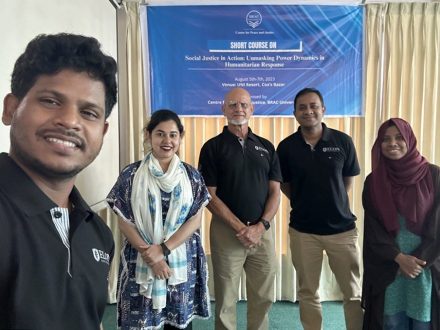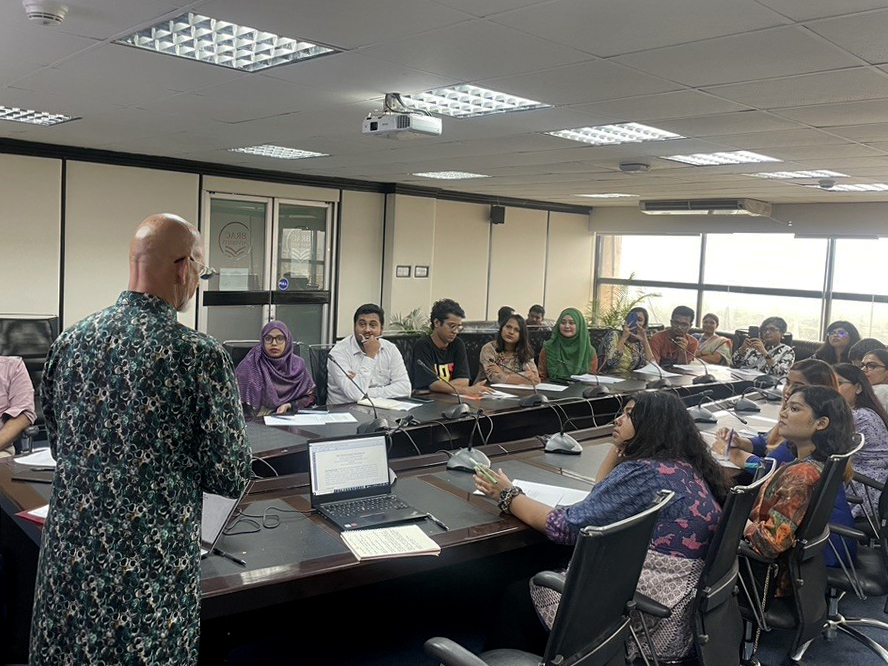Partnered with BRAC University’s Centre for Peace and Justice in Dhaka, Arcaro taught a three-day course around sociological principles, power and privilege, and presented around the importance of women in social movements.
Professor of Sociology Tom Arcaro recently traveled to Bangladesh where he led a three-day course for humanitarian aid workers and a discussion for the Women’s Peace Café through BRAC University’s Centre for Peace and Justice.
Arcaro’s three-day course, “Social Justice in Action: Unmasking Power Dynamics in Humanitarian Response,” equipped humanitarians with effective tools and strategies in working with Rohingya refugee communities in Cox’s Bazar. His Women’s Peace Café talk, “Humanity Needs More Female Voices Now!” focused on allyship and strategies in the face of injustice.
Arcaro has worked with the Centre for Peace and Justice and with Rohingya refugees displaced in Cox’s Bazar for several years, and those experiences have elevated his teaching at Elon. Working with international humanitarians, academics and students with different cultural and lived experiences has added depth to the ways he explains sociological principles, mentors around ethics in aid work and research, and through direct examples of those principles and ethics in action.

“I have learned more about culture and more about pedagogy by doing this than anything else in in my career,” Arcaro said. “It’s easy to convey ideas when you speak the same language and share the same culture — you can use shorthand — but when you’re teaching someone from a different culture in a different language, you have to stretch your pedagogical skills and at the same time be culturally sensitive.”
Participants of the three-day course studied sociological principles and issues of justice through the lens of Arcaro’s Critical Hydra Theory of social oppression and privileging forces used to marginalize groups and individuals. That theory posits that all forms of oppression — from racism and sexism to ageism and classism — are linked by the ways they use othering to segment society into various privileged groups.
During the trip, Arcaro also met with Rohingya refugees who completed a virtual course he taught in summer 2021 during a certificate award ceremony. It was the first time they’d met face-to-face, and those students expressed gratitude for Arcaro and Trevor Molin ’23, who assisted in facilitating the course that summer. Some of those students also worked with the Center for Peace and Justice and Arcaro in creating a short video promoting the value of education among refugee communities.
“They essentially said the sociological concepts in the course enable them to better understand the social forces and power dynamics at play, and more effectively advocate for themselves,” Arcaro said. “Pursuing education is a risk for them because it puts a target on their backs, and they are keenly aware of that, but the general consensus was that they would rather have a target on their back and have this perspective, tool and opportunity than cower and not learn. They emerge as leaders within their community to be advocates for themselves and to encourage seeking opportunities among their friends and associates.”
His presentation at BRAC University’s Peace Café, around the vital role women play in addressing global and societal issues, led to an exchange about how those in positions of power and privilege can be effective allies. The event was covered by The Business Standard.
“We talked about the power dynamics within the refugee camps, and how power, privilege and justice issues are much more acute in that setting,” Arcaro said. “They were very interested in how power and privilege and oppression are connected in a fundamental way, and that part of being a good ally is realizing that you can’t just be an ally to other women. You have to be an ally to people in other marginalized groups. Oppression is oppression, it just has different iterations.”
The ongoing genocide of Rohingya Muslims has roots in civil conflicts dating back to the 1970s and 1980s. In 1982, the government of Burma — now Myanmar — revoked the Rohingya’s citizenship. In 2016, a military crackdown began and escalated into an ongoing series of violent attacks that the UN has said includes wide-scale human rights violations including summary executions, torture and arson. That led to an exodus of hundreds of thousands of Rohingya to Cox’s Bazar and other locations near the Myanmar-Bangladesh border.
Arcaro became more involved in humanitarian issues as the founding director of Elon’s Project Pericles, examining a host of global and social problems with students. That work led to his book, “Aid Worker Voices,” and further work studying issues in international aid. Those connections put him in contact with BRAC University’s Centre for Peace and Justice.
Arcaro has since taught three courses for the Centre for Peace and Justice and is planning a fourth course, yet to be scheduled.



